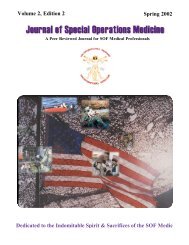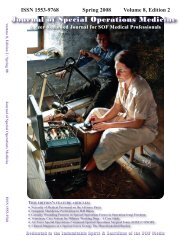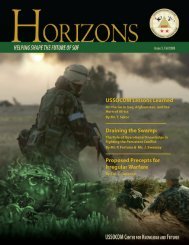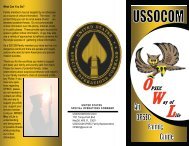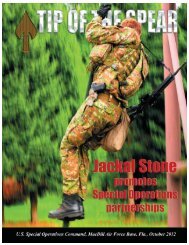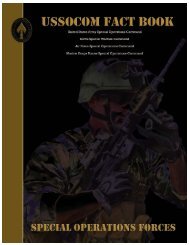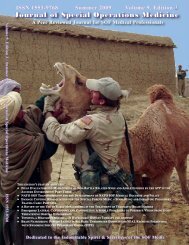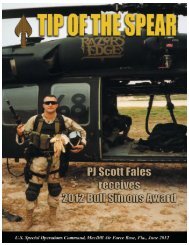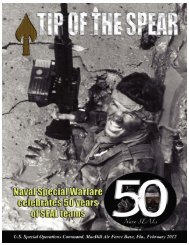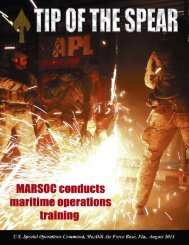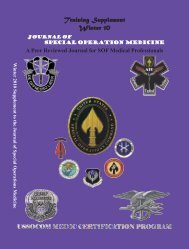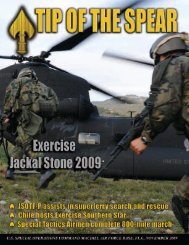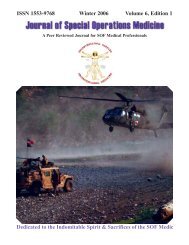HQ$History - United States Special Operations Command
HQ$History - United States Special Operations Command
HQ$History - United States Special Operations Command
Create successful ePaper yourself
Turn your PDF publications into a flip-book with our unique Google optimized e-Paper software.
the impact on its people, the command carefully<br />
reviewed requests for these personnel and<br />
tracked their rate of deployment to prevent overuse.<br />
On 5 November 1997, General Peter J.<br />
Schoomaker assumed command of USSOCOM,<br />
and like General Downing, he brought a wealth<br />
of experience in special operations. In addition<br />
to commanding SOF tactical units, he served as<br />
commander of both JSOC and USASOC. Like<br />
his predecessors, he faced unique challenges as<br />
the command prepared for the twenty-first century.<br />
General Schoomaker’s top priority was to<br />
prepare the SOF community for change in order<br />
to remain relevant to national security requirements.<br />
To that end, he initiated or accelerated<br />
numerous projects, to include the headquarters<br />
reorganization; planning, programming and<br />
acquisition enhancements; and integrating the<br />
components into one resourcing and acquisition<br />
team. During his tenure, SOF participated in<br />
the transition from JOINT GUARD to JOINT<br />
FORGE in Bosnia-Herzegovina, DESERT<br />
THUNDER in Kuwait and Saudi Arabia (to<br />
thwart Saddam Hussein’s attempt to restrict<br />
<strong>United</strong> Nations (UN) inspectors’ freedom of<br />
movement), and numerous contingencies and<br />
peacetime engagements. SOF also played crucial<br />
roles in ALLIED FORCE, the operation that<br />
forced Serbian forces out of Kosovo, and JOINT<br />
GUARDIAN, which enforced the Kosovo peace<br />
agreement.<br />
General Charles R. Holland assumed command<br />
of USSOCOM on 27 October 2000, having<br />
served as the vice commander of <strong>United</strong> <strong>States</strong><br />
Air Force (USAF) in Europe. As <strong>Command</strong>er<br />
USSOCOM, he anticipated “staying the course,”<br />
to implement changes made by previous commanders<br />
and to continue SOF’s key roles in<br />
operations around the world. He emphasized<br />
that SOF had to address the seams and friction<br />
points with the services that had caused operational<br />
difficulties. For example, he instructed<br />
Air Force <strong>Special</strong> <strong>Operations</strong> <strong>Command</strong><br />
(AFSOC) to continue working with the Air Force<br />
to resolve differences observed in the Air War<br />
over Serbia. But, 9/11 would completely reorder<br />
both USSOCOM and General Holland’s priorities.<br />
“On September 11th, enemies of freedom<br />
committed an act of war against our<br />
country. Americans have known wars—<br />
but for the past 136 years, they have been<br />
wars on foreign soil, except for one<br />
Sunday in 1941. Americans have known<br />
the casualties of war—but not at the center<br />
of a great city on a peaceful morning.<br />
Americans have known surprise attacks—<br />
but never before on thousands of civilians.<br />
All of this was brought upon us in a single<br />
day—and night fell on a different<br />
world, a world where freedom itself is<br />
under attack.”<br />
President George W. Bush<br />
20 September 2001<br />
Following the horrific terrorist attacks of<br />
9/11, President Bush told the nation that “every<br />
necessary weapon of war” would be used to disrupt<br />
and defeat the global terror network. He<br />
cautioned that this war would entail a lengthy<br />
General Peter J. Schoomaker<br />
USCINCSOC 1997-2000<br />
10<br />
General Charles R. Holland, USCINCSOC<br />
2000-2003



